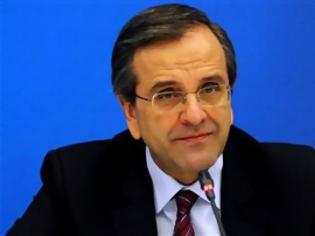By
In the first official visit to the United States by a Greek prime minister since its 2010 international bailout, Antonis Samaras has come to Washington to promote his crisis-plagued country as a source of stability in a troubled region.
Ahead of his meeting with President Obama on Thursday, Samaras was confident that Greece can play a geopolitical role “as a bastion of stability” in the Eastern Mediterranean. Given new energy discoveries in Greece, Israel and Cyprus and a deal for a new pipeline carrying Azerbaijani gas through Greece, Samaras also envisions his country as a provider of energy security to Europe.
“If I had come here a year ago, you would have seen Greece being unstable around an area of stability. Now we look good compared to the region,” he joked at a meeting with the editorial board of The Washington Post on Wednesday.
Samaras is seeking a vote of confidence from Obama and support for his effort to return growth to Greece. The country has entered the fourth year in a program of tough austerity and structural reforms in return for loans from the International Monetary Fund and the European Union, in an effort to avoid default and an exit from the euro zone. The IMF estimates that Greece will reach a structural surplus this year, which is a precondition for its lenders to consider further debt relief.
Samaras did not shy from describing the tough economic reality on the ground, as Greece is going through its sixth straight year of recession, “a world record after the Great Depression,” as he put it. Unemployment has spiked to 27.5 percent, and the rate is more than 60 percent among young people.
Greece has lost more than 25 percent of its GDP while real disposable income has fallen by more than 40 percent, according to the government’s estimates. “We are walking on a thin line. We need to see tangible proofs of light at the end of the tunnel,” the prime minister said.
Samaras also described a real political problem facing Greece: the rise of extremist parties in the left and the right as a result of high unemployment. “Can any modern European or NATO country accept such a high level of unemployment without turbulence?” he asked. Still, even though his coalition government recently lost its third partner, he said it is now stronger and more coherent, pointing to recent difficult votes by the parliament on public administration reforms.
Despite the devastating effects of the economic crisis, there is a changed atmosphere in Greece, Samaras said. This year the country is expecting a record-breaking 19 million tourists, “a rain of liquidity in a dehydrated soil,” as he put it. The deal for the Trans-Adriatic-Pipeline, which will carry the Azerbaijani gas to the European markets through Greece and Albania, is a $40 billion investment in the region that Samaras is optimistic will create jobs. His government is also working closely with Cyprus and Israel to develop common energy policies.
Compared to the constant talk of a Greek euro-zone exit and the political instability before the last elections, these are significant improvements. Greece aims to attract investors and investment funds that will provide cheap financing for small and medium-sized enterprises in an economy struggling for liquidity.
He is already welcoming American investors in his office, promising “the red carpet treatment rather than the usual Greek red-tape procedure,” as he put it. As if to demonstrate his point, after his visit to the Post, Samaras flew to New York to meet with some of them — among others, the Greek American head of Dow Chemical, Andrew Liveris, and the hedge fund manager John Paulson.









